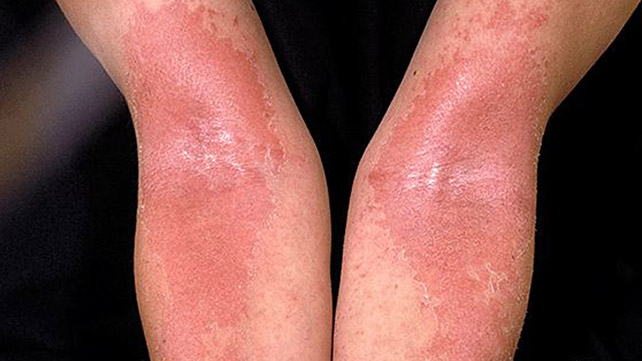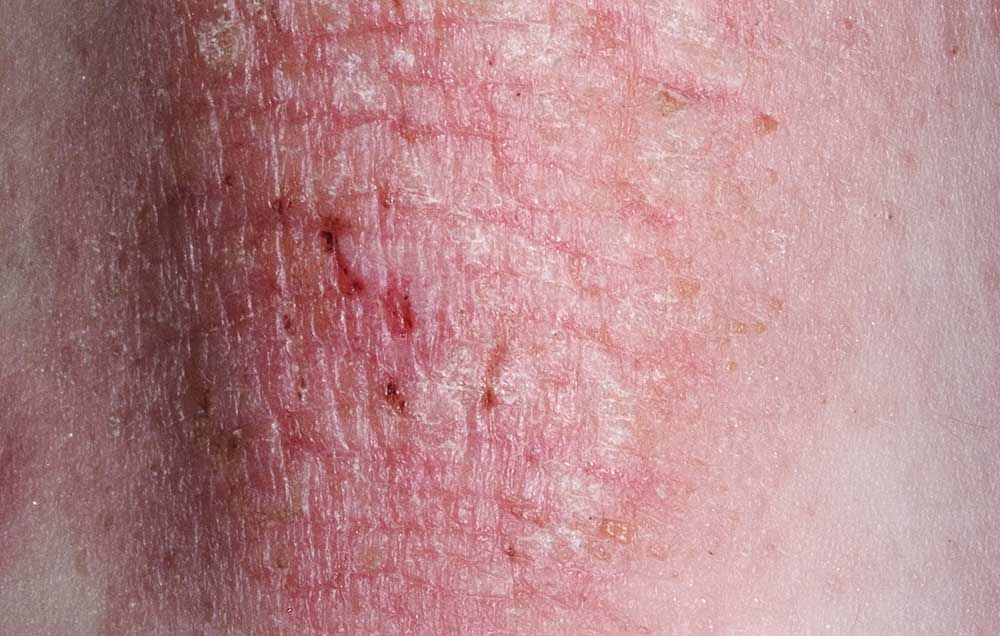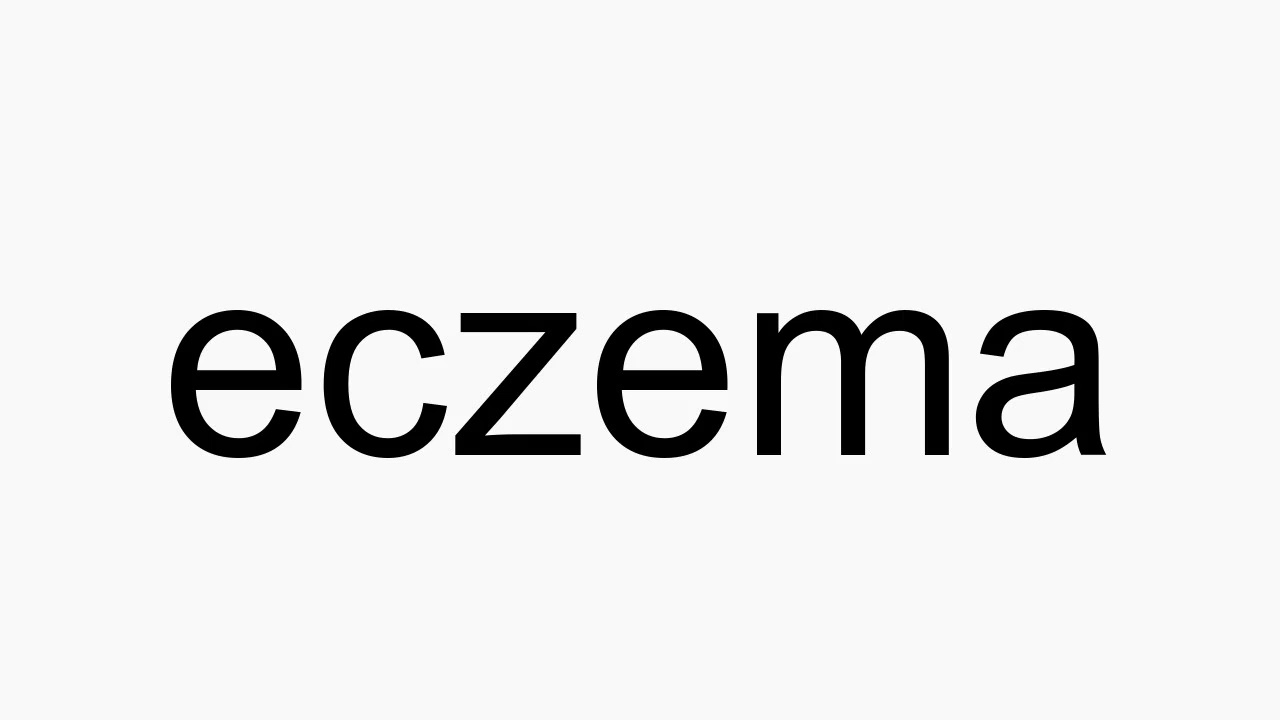How to pronounce eczema? Eczema Pronunciation; How to pronounce eczema. How to say eczema. Listen to the audio pronunciation in the Cambridge English Dictionary. Learn more.
How To Pronounce Eczema
in English (UK)
eczema
/ɛkˈziːmə/
Definitions
noun
inflamed skin; dermatitis.
• eczema
• Pronunciation: /ˈek-sə-mə/
eczema:
1 an inflammatory condition of the skin characterized by redness and itching and the exudation of serous matter.
What’s the Proper Way to Pronounce Eczema?

Eczema is a word that can be pronounced in several ways. The most standard way of pronouncing eczema is ehk-zeh-muh. Another pronunciation we hear sometimes is ehk-seh-muh.
The first pronunciation, ehk-zeh-muh, is the one you’ll find in all the major dictionaries. It’s also the pronunciation that appears when you look up the word on Merriam-Webster’s website and app or Dictionary.com.
If you search for eczema on YouTube, you will see that this is the preferred pronunciation of many medical professionals who have uploaded videos about the disease.
While ehk-zeh-muh seems to be the clear winner as far as proper pronunciation goes, we include both pronunciations because we hear them used interchangeably in everyday speech.
The correct pronunciation of eczema is “ek-zeh-muh” according to the American Academy of Dermatology, although a handful of other pronunciations are also accepted as correct. The word “eczema” comes from Greek and means “to boil over,” which describes the blistering that occurs during an outbreak.
The pronunciation “eck-zeh-ma” is also widely accepted as correct, as is “eck-zeh-muh.” The plural form “eczemas” is pronounced with a hard Z sound: eck-zeh-mahs.
It’s “ek-zuh-muh,” though “eh-kzuh-muh” and “ez-zuh-muh” are also considered acceptable.
Eczema is a condition in which patches of skin become inflamed, itchy and irritated. This can lead to oozing, blistering and crusting. The most common type of eczema is called atopic dermatitis. Typical symptoms include dry, red, itchy skin that can blister, ooze or become scaly, cracked or thickened. It often develops behind the knees, on the inner elbows and on the face and neck.”
When I was a kid, I had eczema. I remember it as a rather embarrassing inconvenience that made me itch. As an adult, it seems like something has changed with eczema, not just its name.
The other day I heard someone refer to “ex-zima” and the person she was talking to corrected her and said “ek-sema.”
I grew up with the latter pronunciation, but at some point in my life it shifted to the former. My wife pronounced it “ex-zima” which is the first time I’d heard it since I was a kid.
I’ve also noticed that when most people say “eczema,” they pronounce the “e” as short instead of long (“ek-sema” instead of “eeeck-sema”).
So what is going on here?
“Eczema” is an English word. It is pronounced like this:
ek-zeh-muh
The pronunciation of “eczema” is affected by the following rules:
Rule 1: Words ending in -ma add a schwa (or neutral) sound to the end of the word.
Rule 2: The letter z can be pronounced as /z/ or /s/.
Rule 3: The letter e can be silent, or pronounced as /ə/, /ɪ/, /i/, or /e/.
Eczema (also known as atopic eczema) is a chronic skin condition that causes red, itchy and inflamed skin. Eczema outbreaks tend to flare up for a few weeks or months and then go away for a time. The word eczema comes from the Greek word “ekzein,” which means “to boil over.”
Eczema affects about 10 percent of people worldwide, according to the National Eczema Association (NEA). It is not contagious and has no cure.
Eczema is often seen in children who have other allergies or asthma. The most common form of eczema affects 90 percent of those with the condition, according to the NEA. This form of eczema is known as atopic dermatitis.
Eczema is a form of dermatitis, or skin inflammation, and can be used as a general term for many types of skin rashes.
Eczema is most often used in reference to atopic dermatitis, the most common type of eczema. Atopic refers to a collection of diseases involving the immune system, including asthma and hay fever. Atopic dermatitis causes the skin to become extremely itchy and inflamed, resulting in scaly, red patches.
What Eczema Means?

Eczema is a chronic skin condition that often appears in childhood. It causes dry, itchy skin that can weep clear fluid when scratched. The severity of the condition varies from person to person and among outbreaks in the same person. There may also be times when eczema goes into remission, where symptoms are less severe or even disappear entirely.
In some people, eczema will improve with age. Others may experience symptoms indefinitely.
Eczema affects at least 30 million Americans, according to the National Eczema Association (NEA). While anyone can get eczema, it’s more common in infants and children than adults.
The most common type of eczema is called atopic dermatitis (AD). People with AD are more likely than others to develop hay fever and asthma. AD usually starts during childhood and then disappears after adolescence, although it can persist into adulthood
Eczema is a chronic, or long lasting, condition. It’s characterized by dry, red, itchy skin that can blister or crack.
There are several types of eczema, with the most common being atopic dermatitis. This type of eczema is often hereditary and can run in families that have a history of other allergies or asthma. Other types include contact dermatitis (which comes from contact with irritants), dyshidrotic eczema (which appears on the hands and feet), and seborrheic dermatitis (a form of dandruff).
Eczema is the name for a group of conditions that cause skin to become red, itchy, inflamed, and sometimes blistering and weeping.
The most common type of eczema is called atopic dermatitis. Atopic refers to a group of diseases with an often inherited tendency to develop other allergic conditions, such as asthma and hay fever. Dermatitis means inflammation of the skin.
Atopic dermatitis is most common in babies and children but adults can have it too. It usually starts before age 5, but it may start when you’re an adult. Most people who get atopic dermatitis have a personal or family history of allergies or asthma.
Eczema eczema is a chronic inflammatory skin disorder that causes the skin to become itchy, red and flaky.
It usually appears during the first five years of life. About 10 to 20 per cent of children have eczema and about two-thirds grow out of it by their mid-teens.
There are different types of eczema but the most common is atopic eczema, which is caused by an overactive response by the body’s immune system to an irritant. This type of eczema can also be associated with hayfever and asthma.
Treatment involves moisturising the skin, avoiding triggers, controlling infection and relieving symptoms.
It’s often the first sign that a child may develop asthma or hay fever later in life.
Anyone can get eczema, but it is most common in babies and children. About 10 to 20 percent of infants have it.
Eczema is a general term for many types dermatitis (skin inflammation). Atopic dermatitis is the most common of the many types of eczema. Other types of eczema include contact dermatitis, allergic contact dermatitis, seborrheic dermatitis, nummular eczema, stasis dermatitis, and dyshidrotic eczema.
Atopic Dermatitis
Eczema is a common condition that affects about 10 to 20 percent of youngsters. It may be accompanied by asthma or hay fever. In fact, about half of the kids with atopic dermatitis (eczema) will develop hay fever or asthma.
The cause of atopic dermatitis is not clear but seems to involve both genetic and environmental factors. Dry skin tends to worsen the itch-scratch cycle.
Patients with atopic dermatitis have an increased number of a certain type white blood cell (eosinophils) in their skin. The role these cells in the disease is not fully understood, but they may be responsible for some chronic skin changes seen in atopic dermatitis.
Eczema is a condition that makes skin red, itchy, and inflamed. Your child might scratch the rash until it bleeds or gets infected. You may notice small, raised bumps or dry, rough patches of skin. It’s most common in infants, but older kids can get it too.
Eczema is very common in babies and young children. In fact, 10% to 20% of kids have eczema at some point before they’re 5 years old. Often, eczema starts when a baby is very young — between 2 months and 6 months old — and may last into childhood and even adulthood.
Eczema can start with a rash on the cheeks, chin, or forehead. Then it spreads to the arms and legs as a kid gets older. Some children only have eczema on certain parts of their bodies, like their knees or elbows — but others get it all over their bodies.
About 65%-70% of children outgrow eczema by the time they’re teenagers.
What causes atopic dermatitis?
